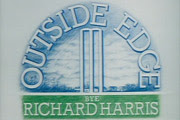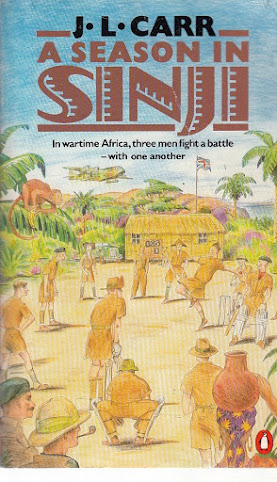Pages
- Home
- Ian Walker's New Society Articles
- 2023 Read
- 2023 ReRead
- 2023 Audiobook
- 2022 Read
- 2022 ReRead
- 2021 Read
- 2021 ReRead
- 2020 Read
- 2020 ReRead
- 2019 Read
- 2019 ReRead
- 2018 Read
- 2018 ReRead
- 2017 Read
- 2017 ReRead
- 2016 Read
- 2016 ReRead
- 2015 Read
- 2015 ReRead
- 2014 Read
- 2014 ReRead
- 2013 Read
- 2013 ReRead
- 2012 Read
- 2012 ReRead
- 2011 Read
- 2011 ReRead
- 2010 Read
- 2010 ReRead
- 2009 Read
- 2009 ReRead
- 2008 Read
- 2008 ReRead
- 2007 Read
Showing posts with label Cricket. Show all posts
Showing posts with label Cricket. Show all posts
Friday, July 28, 2023
Tuesday, May 16, 2023
A Prefect's Uncle by P. G. Wodehouse (A & C Black 1903)
Gethryn strolled to the gate, where the station-master’s son stood at the receipt of custom to collect the tickets. His uncle was to arrive by this train, and if he did so arrive, must of necessity pass this way before leaving the platform. The train panted in, pulled up, whistled, and puffed out again, leaving three people behind it. One of these was a woman of sixty (approximately), the second a small girl of ten, the third a young gentleman in a top hat and Etons, who carried a bag, and looked as if he had seen the hollowness of things, for his face wore a bored, supercilious look. His uncle had evidently not arrived, unless he had come disguised as an old woman, an act of which Gethryn refused to believe him capable.
He enquired as to the next train that was expected to arrive from London. The station-master’s son was not sure, but would ask the porter, whose name it appeared was Johnny. Johnny gave the correct answer without an effort. ’Seven-thirty it was, sir, except on Saturdays, when it was eight o’clock.’
‘Thanks,’ said the Bishop. ’Dash the man, he might at least have wired.’
He registered a silent wish concerning the uncle who had brought him a long three miles out of his way with nothing to show at the end of it, and was just turning to leave the station, when the top-hatted small boy, who had been hovering round the group during the conversation, addressed winged words to him. These were the winged words—
‘I say, are you looking for somebody?’ The Bishop stared at him as a naturalist stares at a novel species of insect.
'Yes,’ he said. ‘Why?’
‘Is your name Gethryn?’
This affair, thought the Bishop, was beginning to assume an uncanny aspect.
‘How the dickens did you know that?’ he said.
’Oh, then you are Gethryn? That’s all right. I was told you were going to be here to meet this train. Glad to make your acquaintance. My name’s Farnie. I’m your uncle, you know.’
‘My what?’ gurgled the Bishop.
‘Your uncle. U-n, un; c-l-e—kul. Uncle. Fact, I assure you.'
Tuesday, May 04, 2021
A Season in Sinji by J. L. Carr (The Quince Tree Press 1967)
I particularly remember one evening at Blackfen. Wakerly and I hadn’t money left for the flicks and were pretending to drink W.V.S. tea, sitting in the bay window of a decaying vicarage dragged back to life for the Duration. It was lashing down—more even than its Lancashire usual—when down the drive, between the sooty laurels, marched this blonde, page-boy hair styling down to her shoulders, lack jumper moulded round a really promising bust, grey slacks and an open scarlet mac flapping around her thighs. She glittered.
Then, in this weather for wellingtons, I saw that she wasn’t wearing shoes. Only sodden silk stockings. She homed straight in over the gravel and through the pools and puddles and, after her, a private soldier paddled at a half-trot. She crossed the canteen in long strides, leaving heel and ball prints on the brown lino, glanced scornfully at us (she must have noticed Wakerly hopefully whip off his steel-rimmed spectacles) and shook the rain from her hair. She was a marvellous looker, officer fodder, and, when she spoke, it was like an aristocrat. Not like the female aboriginees of Blackfen & District.
The man padded humbly in after her and bought two teas. Even in his thick-soled boots the top of his head only came up to her nose. Then she began to slang the slosh in a very loud voice, describing it (rightly) as disgusting dishwater. Everybody stopped talking and the W.V.S. women (doing their bit for the boys) smouldered (but didn’t wither her). And her little man obediently nodded his head (but drank it). Then she shoved her cup back at him and stalked off into the downpour, leaving him to shuffle guiltily to the counter and, then, after her.
Like a film trailer, it had no ending. And no meaning. No, that’s untrue: it was a detail from a bigger picture, a flurry in the crowd watching a game. (And, anyway, I did see her just once more . . . in Africa, glaring insolently at me from a bundle of yellowing Daily Mirrors.) Put it like this— you’re fielding in the deep, the boundary’s edge, and, for a moment and for no reason at all, you catch the glance of someone you’ll never see again. But, for that brief moment, you’re part of each other’s life. This whole business, from start to end, was like that, like a game of cricket, the issue never sure, who’d win, who’d lose, and there were some, like these, who watched momentarily and went away. And others who prodded around, doing what they could but not really knowing what it was all about; I mean not understanding what was at stake as will was pitted against will, as we waited for the change of luck that always comes, watched for a grip to slacken as the game turned . . . That spectator, the one in the red mac, disappeared into the rain.
Wednesday, May 27, 2020
Random George Orwell quote of the day
Found the quote below in amongst my drafts on the blog. I presume the words were uttered by Martin Newell, but the magazine, Rolling Stone, is one of the labels and I find it hard to believe that Martin Newell was quoted in said magazine. I mean, he should, the bloke's a lost and neglected songwriting gem, but it's strange all the same. If nothing else, it has reminded me that his autobiography (part 2) is on my bookshelf, and should be read:
"Everybody's quoting Orwell nowadays on the blogosphere for some reason. Something to do with quintessential Englishness and such like. (England must be getting tanked at the cricket again.)"
Friday, August 24, 2012
The Man Who Lost His Wife by Julian Symons (Penguin Crime 1970)
'Think it's a bore,' Bunce repeated, and laughed in what might have been a meaningful manner. He turned to the sports page in the paper, as though reading an account of the previous day's play would provide some final answer to his questions. Gilbert closed his eyes and saw the cheek he had kissed at parting, wonderfully smooth. Why had she not kissed him on the mouth, did she now find him repulsive? Such ideas were alien to him. He was startled when Bunce said emphatically, 'Sex.'
One of the batsmen had been bowled, his middle stump knocked out of the ground. 'What?'
'That's why you get a kick from it.' He tapped the paper. 'You use the ball, see, and you try to get rid of the stump. See what it says here, Herman uprooted the middle stump and that's what just happened now, right?
'Yes, but -'
'Boy, that bowler's uprooted his middle stump all right, it's a castration symbol, see? And those pads the batter wears, he's protecting his stump with them. He wants to hit that ball, get the damn' thing away from him to the boundary, the limit. Get that ball away, he's saying, I don't want it near my stump. You read what Melanie Klein says about bat and ball games?'
'I can't say I have.'
'They symbolize a fear of sex, keep it hidden, that's the thing, destroy it if you can. And the white clothes, what do they mean but purity? It's a hell of a funny game.' The players went into the pavilion. 'That's it then, glad to have seen it.'
'They'' be coming out again. This is the tea interval.'
'I guess I've seen enough.' With cricket satisfactorily explained Bunce rose to his feet.
Saturday, November 26, 2011
Monday, June 06, 2011
Netherland by Joseph O'Neill (Vintage Contemporaries 2008)

We traveled the length of Coney Island Avenue, that low-slung, scruffily commercial thoroughfare that stands in almost surreal contrast to the tranquil residential blocks it traverses, a shoddily bustling strip of vehicles double-parked in front of gas stations, synagogues, mosques, beauty salons, bank branches, restaurants, funeral homes, auto-body shops, supermarkets, assorted small businesses proclaiming provenances from Pakistan, Tajikistan, Ethiopia, Turkey, Saudi Arabia, Russia, Armenia, Ghana, the Jewry, Christendom, Islam: it was on Coney Island Avenue, on a subsequent occasion, that Chuck and I came upon a bunch of South African Jews, in full sectarian regalia, watching televised cricket with a couple of Rastafarians in the front office of a Pakistan-run lumberyard. This miscellany was initially undetectable by me. It was Chuck, over the course of subsequent instructional drives, who pointed everything out to me and made me see something of the real Brooklyn, as he called it.
Saturday, May 23, 2009
Wiki quote of the day
Via the wiki page of Mike Denness:
In Australia, Denness once received an envelope that had been sent with the address "Mike Denness, cricketer". The letter inside read, "Should this reach you, the post office clearly thinks more of your ability than I do."
Subscribe to:
Posts (Atom)





